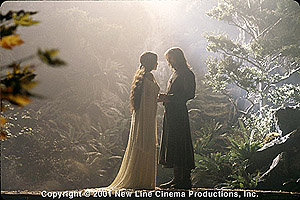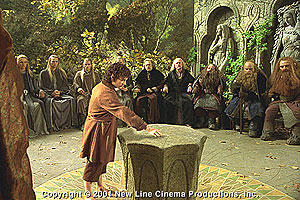
Copyrighted Material

Tolkien at the End of Time;
Alchemical Secrets of The Lord of the Rings
By Jay Weidner and Sharron Rose
Through a unique constellation of innate gifts, experiences
and other factors, which led to a deep philosophical understanding
of the forces that shape our reality, J.R.R. Tolkien was able
to become a witness to, and documenter of, the deeply profound
spiritual history of humanity, especially that of the English,
Celtic and Northern Peoples of Europe. He describes these
gifts as a 'sensibility to linguistic patterns', which have
an emotional effect on him in the same manner as color or
music; the 'passionate love of growing things' and a 'deep
response to legends that have what he called the North-western
temper and temperature.' 7 Having being drawn to
and immersing himself in the beauty and power of the great
epics of Greece, Scandinavia, Finland, Germany and more, he
wanted to ' restore to the English an epic tradition and present
them with a mythology of their own."8 In a
letter to his friend Milton Waldman dated 1951 that can be
found at the beginning of The Silmarillion, Tolkien
states,
" I was from early days grieved by the poverty of
my own beloved country: it had no stories of it's own (bound
up with it's tongue and soil), not of the quality that I sought,
and found (as an ingredient) in legends of other lands.".
"Once upon a time, I had a mind to make a body of more
or less connected legend, ranging from the large and cosmogonic,
to the level of romantic-fairy-story the larger founded
on the lesser in contact with the earth, the lesser drawing
splendour from the vast backcloths which I could dedicate
simply to: to England; to my country. "
From the tremendous response to The Lord
of the Rings that continues to grow and swell with time,
it is clear that in this noble and heroic task, J.R.R. Tolkien
has achieved his goal. For in this monumental work he has
struck a chord that resonates deep within the hearts of so
many of us.

The Language of the Birds
What is it about The Rings Trilogy
that touches our hearts so deeply? It is the subtlety, grace
and eloquence of Tolkien's language, the manner in which it
speaks to us of wistful memories of an Age gone by. That is
really what makes the books so appealing. From childhood,
Tolkien had a gift for creating 'imaginary' languages. This
gift, which lay at the root of his work, this ability to attune
his ears and inner sensibility to those of a more subtle vibratory
frequency, naturally led him to take up philology (the study
of language) as his profession. This scholarship allowed him
to trace words, expressions and vernacular backwards through
history and culture to their root source. This research into
the roots of language, known in the alchemical lore as the
'Language of the Birds' or 'Language of the Gods',
would logically lead him to ponder the hidden mysteries or
secret messages which have been passed down from the ancients
through the vehicle of the spoken and written word.
In Le Mystère des Cathédrales, Fulcanelli
describes this sacred language or argot as, " the language
which teaches the mystery of things and unveils the most hidden
truths." He tells us that it was the 'parent and doyen'
of all languages, that it was the "knowledge of this
language which Jesus revealed to his Apostles, by sending
them his spirit, the Holy Ghost, " and that "tradition
assures us that men spoke it before the building of the Tower
of Babel, " an event which Fulcanelli describes as causing
this "sacred language to be perverted and to be totally
forgotten by the greater part of humanity". 9
Fulcanelli also tells us that this arcane language of the
spirit uses the law of phonetics in which the ear of the listener
and eye of the reader is focused upon sound and meaning rather
than spelling.10 Through his lifetime of research
and attunement to the sacred origins of language, through
the art of 'listening' and pondering the relationship of sound
to manifestation, communication and the origins of the root
language of a race, Tolkien came to realize that each name,
word and descriptive phrase was the current manifestation
of a cultural tapestry that wove itself backwards through
thousands of years of history.
In other words, his study of the history of language placed
Tolkien at the paragon of arcane knowledge that, once decoded,
revealed the secret history of our race. The Bible tells us
that," In the beginning was the word" and it was
through his studies into the origins and development of words
and language, as well as the great legends of ancient civilizations
that Tolkien came to understand the way that a culture is
shaped and re-shaped through history. The 'quality' of time
would also have been revealed to him through his study of
the history of linguistic meaning. As words are reshaped they
reflect the 'quality' of their era. Like anyone who delves
ever more deeply backwards into history, Tolkien came upon
the essential questions; Who/what are the forces that shape
and re-shape history? What is their source? What is their
fundamental purpose? What is our relationship to these powerful
forces? Who are we?

While pondering questions such as these, Tolkien
came to understand that it was very likely that, once upon
a time, what we today would consider strange and magical forms
of sentient beings, did exist in our world. Elves, Dwarves,
Wizards and possibly even Hobbits, or creatures very much
like them, appeared to be embedded in the languages that he
studied. Whether Tolkien actually believed that these creatures
existed in our past is not as important as the fact that his
understanding of philology revealed their presence. Did his
attunement to the subtle vibratory frequencies of sound, an
attunement more refined than the majority of humanity cares
to experience in this Age of the Machine, allow him to travel
back in time to a former Age of our world to perceive the
presence of creatures such as these?
Tolkien himself describes the process by which he created/documented
his story as a linking together of tales that arose in his
mind as 'given' things, a record of "what was already
'there' somewhere, not of 'inventing'." 11 By
listening to and contemplating the fundamental sounds or seed
syllables of words drawn from ancient European culture, was
Tolkien tuning in to the essential spirit of Old Europe and
the voices of his ancestors? In a letter dated 7 September
1955, Tolkien tells us,
"..the name Frodo is a real name from the German
tradition. Its Old English form was Froda. Its obvious connection
with the old word frod, meaning etymologically 'wise by experience',
but it had mythological connexions with legends of the Golden
Age of the North."
From his philological research, and immersion into the teachings
of Catholicism, which have their root source in the Old Testament
of the Hebrews and the story of Genesis, Tolkien must have
become aware that each sound has a corresponding essence/
vibratory frequency that brings thought into manifestation.
He could even have known about the debate on the nature of
sound and words that took place in the Middle Ages between
the Realists and Nominalists on the metaphysical significance
of language. As eloquently documented by philosopher and cultural
historian Jeremy Naydler in his book Temple of the Cosmos,
the Realists argued from the perspective that all sounds are
sacred, having their origins in the Divine. For them as for
the great Alchemical and Tantric adepts, and Kabbalistic,
Sufi and Christian mystics, words, express by their very nature,
the spiritual essence of a thing. In contrast, the secularly
oriented Nominalists insisted that words are merely a product
of human convention, arbitrarily created by human beings for
the purpose of convenience and communication. From their viewpoint,
words have no connection whatsoever to the inner nature of
things. 12 Due to this 'victory' of the Nominalists,
the vast majority of Europeans lost their connection to one
of the greatest mysteries of their tradition, and heritage
- knowledge of the truly sacred nature of sound and language.
But Tolkien, whose years of linguistic research and decipherment
had re-tuned his sensibilities, clearly had intimate knowledge
of this ancient spiritually oriented view of the role of sound
in the creation and manifestation of reality. In The Silmarillion
he describes the process of creation in a manner that corresponds
to creation myths from numerous ancient cultures across the
planet,
"In the beginning, Eru, the One, who in Elvish tongue
is named Ilúvatar, made the Ainur of his thought; and
they made a great music before him. In this Music the World
was begun: for Ilúvatar made visible the song of the
Ainur, and they beheld it as a light in the darkness. And
many among them became enamoured of its beauty, and of its
history which they saw beginning and unfolding as in a vision.
Therefore, Ilúvatar gave to their vision Being, and
set it amid the Void, and the Secret Fire was sent to burn
at the heart of the World. "
Fulcanelli calls the secret fire an 'occult agent,
which to give a hint about its form, is more like water than
flame." He states that, "This fire or burning
water is the vital spark communicated by the Creator to
inert matter, it is the spirit enclosed within things. "13
He also refers to the secret fire as "the universal
spirit that allows the artist or alchemist, the 'imitator
of Nature and of the Divine Great Work to separate
in his little world the luminous, clear, crystalline
parts from the dark, course and dense parts. "14
Previous
-|- Page 1 -|- Page
2 -|- Page 3 -|- Page 4
-|- Page 5 -|- Page
6 -|- Page 7 -|-Next
|



